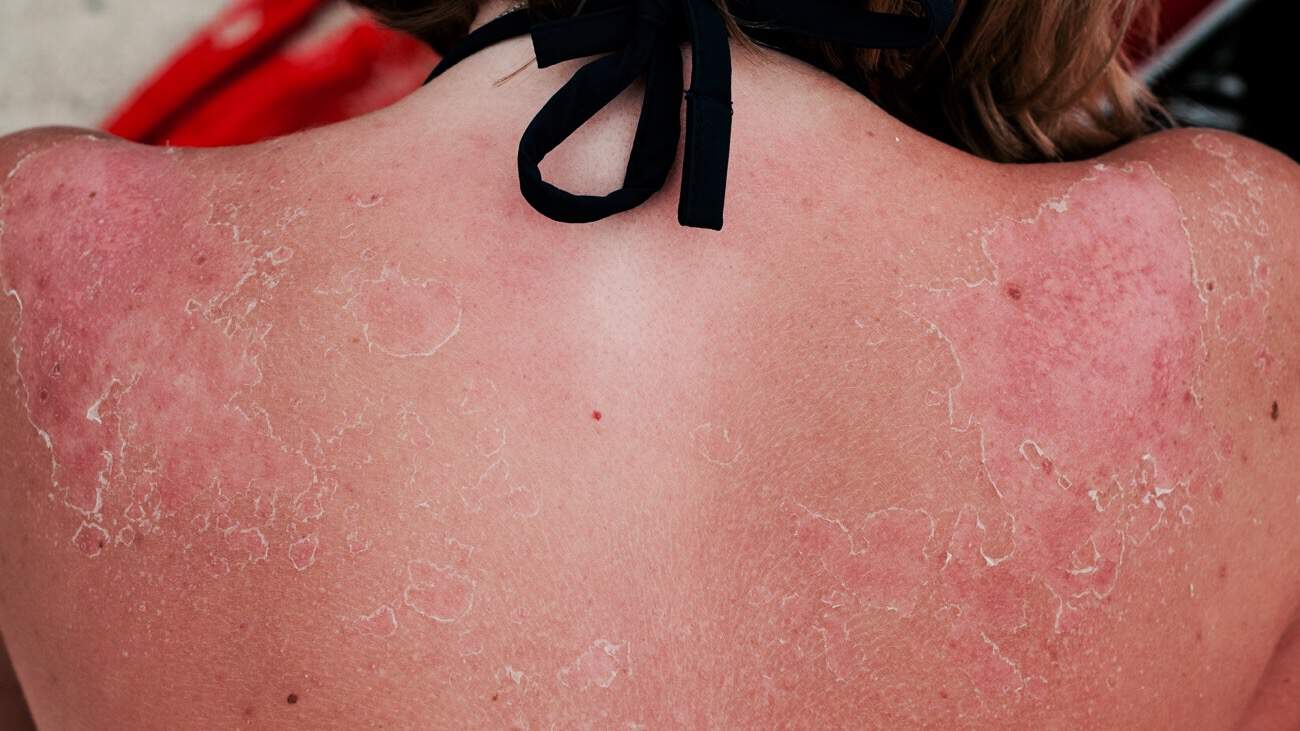When summer comes around, going out to the beach or the park when the sun is out just seems natural. Sometimes, though, we don’t always remember our sunscreen. When we spend all day out in the sun, most people expect to get a little tan, or maybe even a bit of redness or sunburn.
However, this isn’t the only danger to consider when you’re out in the sun all day. When you get too much sun, your skin becomes damaged by the UV rays. While it isn’t technically poisoning, it’s a name given to sunburn that is so severe that it affects the rest of your immune system. Here’s how to tell if your sunburn has turned into sun poisoning.
5 Signs You Are Suffering From Sun Poisoning
So how do you know if you have sun poisoning? And what does sun poisoning feel like? Here are some of the main symptoms and signs that you may be suffering from sun poisoning. Severe sunburns and subsequent sun poisoning can take effect after a relatively short time in the sun, so it is important to prevent sunburns with protective clothing and sunscreen, and treat with typical sunburn relief methods as soon as possible when the symptoms start to arise.
“A severe sunburn can be the start of this problem, which can increase over time until people cannot tolerate any sun exposure at all.” – Dr. Andrew Weil
1. You’re experiencing flu-like symptoms
When you spend too much time in the sun, the damage done by UV rays can release chemicals into your body that then turn on your immune system. The achy, flu-like feeling that results is caused by sun poisoning. While it isn’t technically poisoning, it’s a name given to sunburn that is so severe that it affects the rest of your immune system.
According to dermatologist John Anthony, “When the skin is damaged by UV rays, it releases chemicals that basically turn on the immune system and make you feel terrible like you’ve got the flu.” So, if it’s summertime and you feel like you’ve got the flu, this could be a sign that you’ve got sun poisoning. Visit your doctor if you’re feeling like you caught the flu after a day at the beach.
2. Your skin starts prickling and gets too hot to touch
When you get regular sunburn, your skin is hot to the touch and it becomes uncomfortable with pressure — you might feel like you are having an allergic reaction. However, sun poisoning is going to hurt way, way worse. While sunburns tend not to hurt if you leave them alone, sun poisoning will cause a prickling sensation all over your body, and can cause pain so severe you may feel like screaming.
To relieve the pain, ensure you get a cool compress, aloe gel and ibuprofen to wait out the pain.
3. You start feeling dizzy or lightheaded
A combination of too much sun and dehydration can leave you feeling dizzy, nauseous and suffering through a mighty headache. If your head feels lightheaded, the best thing to do is get plenty of rest and stay hydrated. Drink plenty of fluids and lay down if you have to.
According to Dr. Richard Foxx, “You might start to feel dizzy, have bouts of nausea, or have a headache (to name a few), along with a sun rash. It’s important to note that sunstroke symptoms differ from sun poisoning and sunburn. Drink plenty of fluids for a few days. Ensure a few of these have electrolytes in them so your body gets rebalanced.”
Spending too much time in the sun can make you sweat, which will can quickly dehydrate your body and lead to that uncomfortable, dizzy feeling.
4. You start running a fever or just feel feverish
A fever means that your body is trying to fight something off. If you feel like you’re getting feverish when you’re out in the sun, or just after you come inside, it’s best to call your doctor or visit the urgent care. Spiking a fever means something is going wrong inside your body, and the cause could be sun poisoning.
To avoid this, make sure that the next time you go out in the sun, you apply sunscreen at least a half an hour before heading out, and to keep reapplying every couple of hours.
5. You start falling asleep in the sun
It can be so tempting to just drift off to sleep while laying on the beach or poolside. However, when you’re asleep you can’t accurately gauge how much sun your body is getting and whether or not you need to move inside. Sunburn can happen fairly quickly, and it can take a few hours to a whole night for the effects to reach their maximum potency. Try to avoid this kind of long term sun exposure, especially without protective clothing, but if you happen to fall asleep in the sun, take precautions and stay hydrated, even if you think you might be feeling okay.
Sun poisoning can be incredibly uncomfortable, and while not often fatal, it still isn’t fun. After a day in the sun, monitor your skin for any redness and keep hydrated just in case you spend too long enjoying the warm weather. There are ways to soothe a sunburn after being in the sun, but the best way to ensure you don’t get sun poisoning while you’re out and about is to follow medical advice and apply sunscreen 30 minutes before you leave the house.
If you’re swimming at the beach or the pool, apply every two hours afterward when you get out of the water. Stay hydrated as well! Make sure you always have water with you. If you are worried that you might be experiencing something beyond a regular sunburn, contact your local health care professional, and follow their medical advice. You’ll sweat more than you realize when you’re out in the sun, especially if you’re swimming. Summer is always fun, but it’s crucial to ensure safety comes first!














 Community
Community

